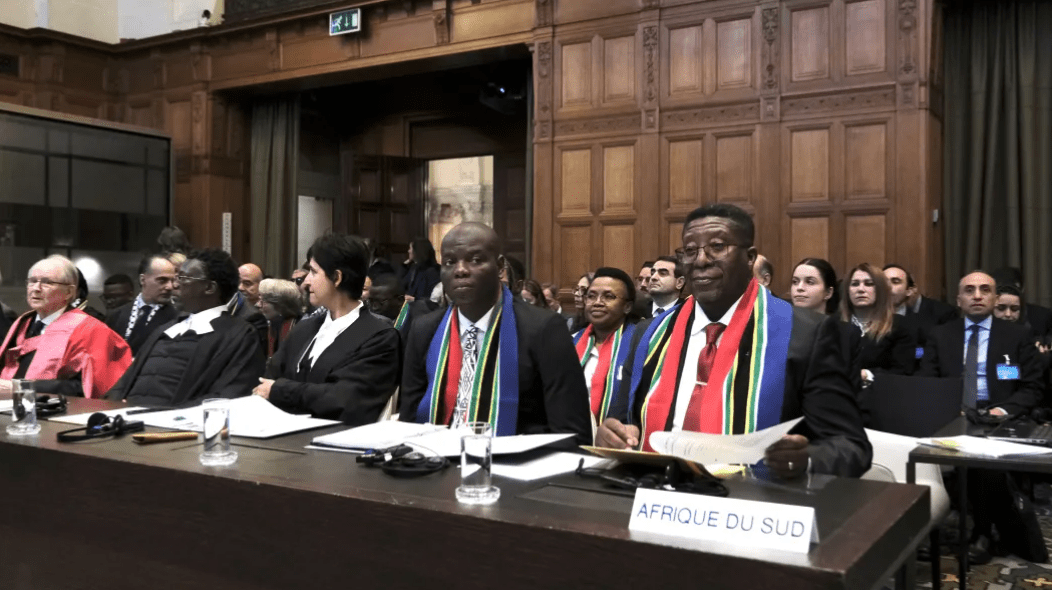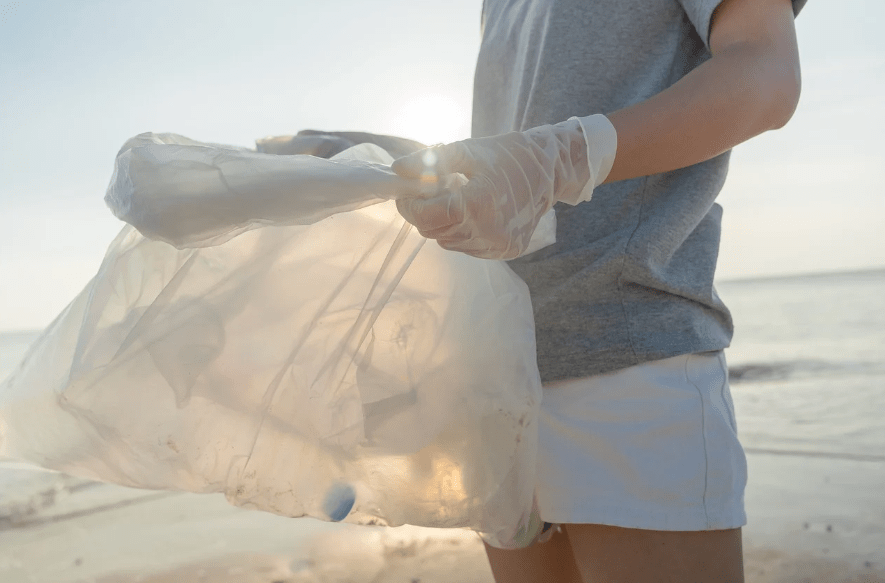South African justice minister Ronald Lamola led a top legal team to argue the country’s genocide case against Israel at the International Court of Justice (ICJ) on 11 January.
South Africa argues that Israel’s indiscriminate retaliatory bombing and siege of Gaza contravenes the Genocide Convention. More than 23,000 Palestinians, including at least 10,000 children, have been killed. Narnia Bohler-Muller, an international law and human rights law expert, says the South African legal team argued soundly that Israel’s actions in Gaza are genocidal, and tells us who is who in the team.

John Dugard
Professor John Dugard is an internationally renowned expert in international law and has been cited by academics, practitioners and courts alike nationally and internationally.
His experience of sitting on the bench of the ICJ as an acting judge and as a member of a Rapporteur of the commission established to determine the human rights and living conditions of people living in Palestine is particularly pertinent.
Dugard has been a member of the Board of Trustees of Law for Palestine since 2020. He was recognised for his contributions to the law by receiving the Order of the Baobab in 2013. This is South Africa’s highest award for community service. He has received several honorary doctorates from South African universities for his work in human rights and international law.
The late Constitutional Court judge Justice Ismail Mahomed paid tribute to Dugard for his role in South Africa’s democratic constitution making project in 2003.
… the voice and the influence of John Dugard was fulsome … The entrenchment of fundamental human rights in the South African constitution which followed vindicated a lifetime of struggle … for the ideals which had absorbed so much of his energies and his passion.
A professor of international law at the University of Leiden, Dugard has also served on the International Law Commission, the United Nations body tasked with the development of international law, since 1997.
Notably, after the outbreak of the second uprising by Palestinians against Israeli occupation in 2000, the UN Commission on Human Rights appointed him to chair a commission of inquiry into the state of human rights in the Palestinian territories.
He is a member of various international law associations, including the prestigious Institut de Droit International, of which he is the first and only South African member.
Max du Plessis
Advocate Max du Plessis has been an advocate for 23 years, practising and teaching mostly in the South African city of Durban. He is associated with the Doughty Street Chambers in London and is an associate fellow at Chatham House, London.
Du Plessis is without any doubt one of the top minds in international law. He combines practice and academic work. He is an adjunct professor at the University of Cape Town and Nelson Mandela University.
As an international lawyer, he advises governments, international organisations and NGOs. He has appeared in or advised on cases before, among others, the International Criminal Court, the African Commission on Human and Peoples Rights, the Southern African Development Community Tribunal, and the East African Court of Justice.
Du Plessis has submitted friend of the court briefs before the US Supreme Court, the US Court of Appeals and the Israeli Supreme Court. He is the lead or co-author of textbooks prescribed by most law schools in South Africa. The most recent is International Law: A South African Perspective (2018 – 5th edition) .
In 2015, he acted for the Southern African Litigation Centre, to counter the South African government’s argument that then Sudanese president Omar al-Bashir, who was visiting South Africa, had immunity from prosecution for war crimes under customary international law as a head of state.
The Supreme Court of Appeal agreed and found that South Africa was obligated by law as a signatory of the Genocide Convention to cooperate with the International Criminal Court and to arrest al-Bashir. This ruling would have compelled South Africa to arrest Russian president Vladimir Putin, against whom the ICC has issued a warrant for war crimes, should he have attended the Brics summit in Johannesburg last August.
Adila Hassim
Advocate Adila Hassim was admitted to the Johannesburg Society of Advocates in 2003. She is the co-founder of the anti-corruption organisation Corruption Watch and serves on its board. She started her legal career working as a clerk for late Chief Justice Pius Langa, and is a highly regarded human rights advocate.
Hassim is a passionate defender of vulnerable and marginalised communities. She was involved in the groundbreaking 1997 Constitutional Court case which clarified, for the first time, that the state was obliged to fulfil its socio-economic rights obligations in terms of the constitution. This case dealt with the right to health and created a legal precedent.
She took a lead in the Life Esidimeni arbitration over the deaths of at least 144 mental health patients. In winning this arbitration, Hassim and her team brought some comfort to the families of these victims. During the inquest into the deaths, she represented the civil rights NGO Section 27 and families of the deceased. She is the co-founder and director of litigation at Section 27.
She was also involved in the 2015 silicosis and tuberculosis class action against the gold mining industry which was settled out of court.
Hassim’s preferred areas of practice include constitutional, administrative, health and competition law and she has been an acting judge. She has left an indelible mark on health law and the right to access healthcare in South Africa.
Hassim has been outspoken in her defence of LGBTQ rights. She opposed the appointment of former Chief Justice Mogoeng Moegoeng on this basis at the Judicial Service Commission.
Tembeka Ngcukaitobi
Tembeka Ngcukaitobi is an experienced international conflict resolution advocate at the Pan African Bar Association of South Africa. He specialises in competition law, labour law, constitutional law and commercial law. He was appointed by President Cyril Ramaphosa to the Judicial Service Commission in 2022 and joined the Competition Tribunal in 2023.
Ngcukaitobi is an excellent senior counsel, despite one misplaced legal argument in a rape case, which benefited the accused and caused much controversy.
He is trusted by government and opposition parties to take on cases of public interest.
Ngcukaitobi gained public prominence during the tenure of former president Jacob Zuma. He grew in popularity after forming part of the legal team of the Economic Freedom Fighters, South Africa’s second largest opposition, that successfully argued in the Pretoria High Court for former public protector Thuli Madonsela’s “state of capture report” to be made public. This allowed unprecedented transparency around a very controversial document and eventually led to the establishment of the judicial commission into state capture.
Ngcukaitobi also represented the State Capture Commission in its successful application to have Zuma jailed for contempt of the Constitutional Court.
He has served as counsel in a successful bid to overturn former public protector Busisiwe Mkhwebane’s report on alleged misconduct during Ramaphosa’s campaign to lead the governing African National Congress. This added to the evidence which led to Mkhwebane’s parliamentary impeachment in 2023.
In 2023 he represented 19 political parties in an application at the Pretoria High Court to declare the country’s scheduled power cuts unconstitutional.
Other members of the South African team are junior counsel: Tshidiso Ramogale, Sarah Pudifin-Jones and Lerato Zikalala.
External counsel supporting South Africa in its ICJ application are:
- Vaughan Lowe King’s Counsel. He teaches public international law at Oxford University and has acted as a judge or arbitrator in multiple international legal disputes.
- Blinne Ni Ghrálaigh, KC. She has acted in genocide litigation before, appearing on behalf of Croatia in the ICJ.
This article was produced by The Conversation.

